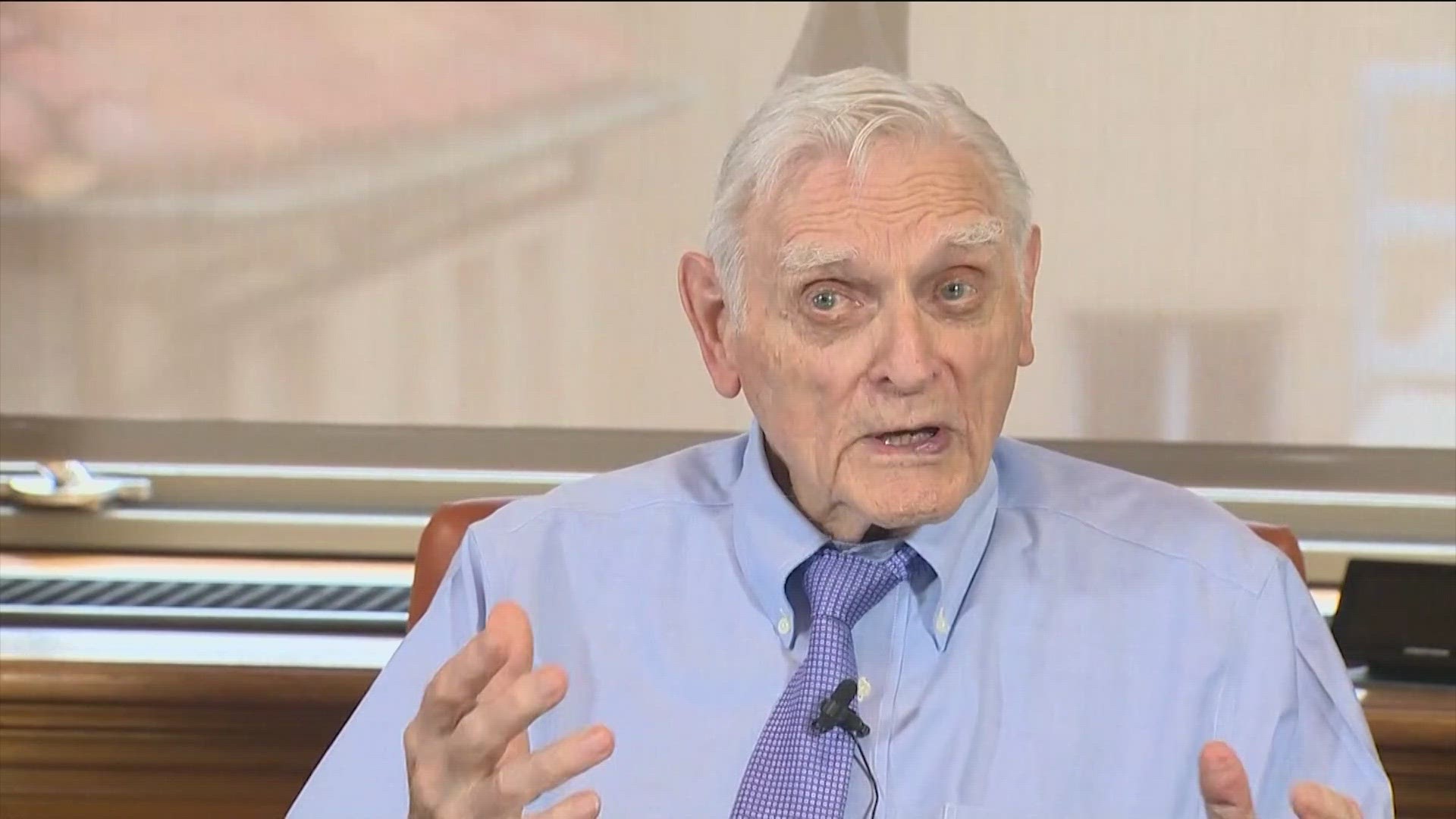AUSTIN, Texas — John Goodenough, a University of Texas at Austin professor who is known worldwide for the development of the lithium-ion battery, died Sunday at the age of 100, UT announced Monday.
The lithium-ion battery is the predominant type of battery used in both portable electronics and electric vehicles. In 2019, Goodenough was awarded the Nobel Prize in chemistry for his battery work, becoming the oldest person to receive a Nobel Prize.
"John’s legacy as a brilliant scientist is immeasurable – his discoveries improved the lives of billions of people around the world," UT Austin President Jay Hartzell said. "He was a leader at the cutting edge of scientific research throughout the many decades of his career, and he never ceased searching for innovative energy-storage solutions. John’s work and commitment to our mission are the ultimate reflection of our aspiration as Longhorns – that what starts here changes the world – and he will be greatly missed among our UT community.”
According to UT, Goodenough served as a faculty member in the Cockrell School of Engineering for 37 years, holding the Virginia H. Cockrell Centennial Chair of Engineering and faculty positions in both the Walker Department of Mechanical Engineering and the Chandra Family Department of Electrical and Computer Engineering. His research continued to focus on battery materials.
"Goodenough identified and developed the critical cathode materials that provided the high-energy density needed to power electronics such as mobile phones, laptops and tablets, as well as electric and hybrid vehicles," a UT press release stated. "In 1979, he and his research team found that by using lithium cobalt oxide as the cathode of a lithium-ion rechargeable battery, it would be possible to achieve a high density of stored energy with an anode other than metallic lithium. This discovery led to the development of carbon-based materials that allow for the use of stable and manageable negative electrodes in lithium-ion batteries."
Goodenough was born in Germany in 1922 but grew up in the U.S. In 1944, he earned a bachelor's degree in mathematics from Yale University. After time serving as a meteorologist in the U.S. Army, he completed a master's degree and Ph.D. in 1952, both in physics from the University of Chicago.
According to UT, Goodenough began his career at the Massachusetts Institute of Technology's Lincoln Laboratory in 1952. There he worked for 24 years, laying the groundwork for the development of random-access memory (RAM) for the digital computer.
He also emerged as one of the founders of the modern theory of magnetism, which became known as the "Goodenough-Kanamori Rules" and which provide a "practical guidance in the research of magnetic materials and have a huge impact in developing devices in telecommunications," according to UT.
After his time at MIT, Goodenough became a professor and head of the Inorganic Chemistry Laboratory at the University of Oxford. It was during this time that he made his lithium-ion discovery.
Goodenough came to UT in 1986, "setting out to develop the next battery breakthrough and educate the next battery innovators," according to the university.
According to UT, Goodenough was still coming to work well into the 90s and frequently told others "don't retire too early!"
In addition to his Nobel Prize, Goodenough was also the recipient of the National Medal of Science, the Japan Prize, the Charles Stark Draper Prize, the Benjamin Franklin Medal, the Enrico Fermi Award, the Robert A. Welch Award, the Copley Medal and many others. UT said that Goodenough frequently donated the monetary prizes from his awards to the university.
In 2006, he established the John B. and Irene W. Goodenough Endowed Research Fund in Engineering. In 2016, he established the Irene W. Goodenough Endowed Presidential Scholarship in Nursing in honor of his wife, Irene. St. Catherine’s College at the University of Oxford also established the Goodenough Fellowship in chemistry in Goodenough's honor.
Goodenough authored several books, including an autobiography titled “Witness to Grace,” published in 2008.
While Goodenough never had any children of his own, he and his wife were married for over 70 years until her death in 2016.

